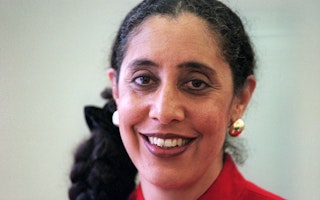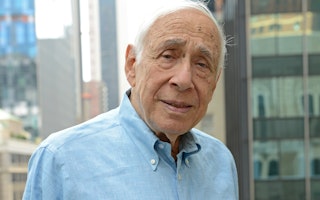Building a Prison-to-Purpose Pipeline for Women
By Donysha Smith

Sixty-seven out of every 100,000 women in the United States are in prison; more than half of them have minor children. When lawyer, mother, and 2015 Soros Justice Fellow Andrea James found herself behind bars, she experienced the criminal justice system from the inside out. What she found was a system that does not address the needs of women in prison or the families they leave behind. James spoke to us about her work.
Tell us about the moment that moved you to advocacy.
I am a lawyer who comes from a family of lawyers, doctors, and educators. My parents marched with Dr. King and went into prisons and taught. My grandmother broke the color barrier for African American nurses in Boston. Advocacy is in my bones.
I was certainly fast-tracked when I walked into the federal prison in Danbury, Connecticut, knowing that I wasn’t able to turn around and walk back out. As professionals in criminal justice, as justice advocates, we think we know about the system. We might know about the procedural aspect, but we have no clue what it’s really like to be in prison.
I was an incarcerated woman and experienced first-hand the harm done by sending mothers to prison and separating them from their children and communities. I heard heartbreaking stories from women struggling with addiction and other physical and mental health issues not being addressed in prison. When you add to that the horror of being away from your children, it is an overwhelming experience.
Prison changes everything about who you are and how you think. It can totally destroy you, or you can use the injustices in our current system of over-incarceration as fuel to advocate for yourself and others. From the first day that I walked into that prison, I knew this is what I would be doing.
How did you take Families for Justice as Healing from the prison yard to the outside world and beyond?
I made the connections before I came home, and my first outing was to attend a state house hearing in support of ending mandatory-minimum sentencing.
I stayed connected to the women I left behind in Danbury. Time passes. Loved ones move on. Children grow. We don’t talk enough on a national level about the challenges women face upon re-entry. Connecting our sisters and brothers on the inside to people on the outside, working together on meaningful projects, plugs women back into life and the energy and resources of the movement.
From 1980 to 2010, the number of women in prison increased at one-and-a-half times the rate of men. What do you attribute this to?
When the prison industrial complex is the default for addressing all social problems, the most vulnerable populations are the ones who get caught up. We’ve gone down a slippery slope in this country where we believe that everything requires a period of incarceration and that, of course, has led to an increase in incarceration of women.
Women have always done time right along with their loved ones. In addition, we go to the visits, raise the children, send money orders, buy packages, pay phone bills, and deal with the depression that comes along with being in or having a family member in prison. There is an added layer for black women due to decades of over-criminalization and mass incarceration of black men. Our men have been taken from us for generations.
The disproportionate number of black people in prison in this country and the disparate application of the law are unconscionable. It’s a human rights violation.
Criminal justice reform is at the top of this administration’s domestic policy agenda with the My Brother’s Keeper initiative, and a hot topic in the ramp-up to the 2016 elections. The focus seems to be on men and mass incarceration. How do you plan to integrate into the national discussion the impact of incarceration on women, children, and the community?
My goal is to create a platform for women’s voices and keep scaling up. We create gatherings of women working together to change the lives of women inside and outside of prison, and use our collective voices and experiences to influence the national discussion.
So many women come home scared, confused, and alone, just trying to put all the pieces of their lives back together. They jump through hoops to find housing, meet requirements to see their children, pee in cups while under post-incarceration supervision, navigate now unfamiliar family dynamics while dealing with trauma. During re-entry, it helps to have something other than all of those immediate struggles to focus on. It helps to be of service to our community of women still inside.
Each time we come together, our numbers grow. Our FREE HER Justice Advocacy Conference held at the Charles Hamilton Houston Institute for Race & Justice at Harvard Law School was a follow up to our FREE HER rally. The Harvard conference convened more than 100 formerly incarcerated women to coalition-build and connect in order to elevate our voices and projects.
What do you hope to accomplish by the end of your project, and what do you see yourself doing in the next five to ten years?
I will create a network of formerly incarcerated women actively engaged in sharing information, resources, and communication tools to ensure that the needs of women impacted by mass incarceration are met. The work is not easy and it can often trigger painful memories. However, coming together in support of one another and sharing in sisterhood is important to our well-being. I want to help connect women so we can heal ourselves and our communities.
Until December 2018, Donysha Smith was a communications associate for U.S. Programs.

